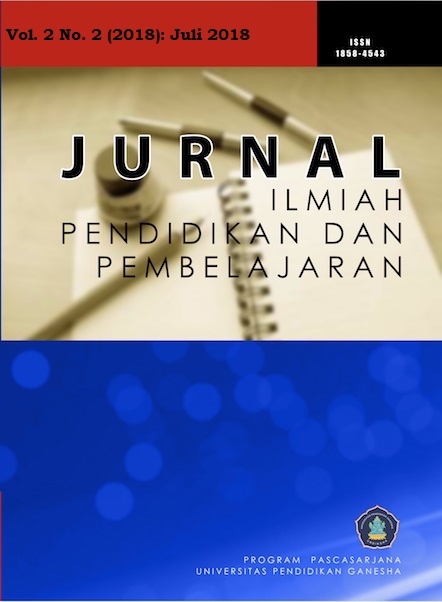PENGARUH MODEL PEMBELAJARAN OPEN ENDED BERBASIS PENILAIAN PROYEK TERHADAP KOMPETENSI PENGETAHUAN PPKn SISWA
DOI:
https://doi.org/10.23887/jipp.v2i2.15407Abstract
The purpose of this research was to know the significant difference of knowledge competence of PPKn group of students which were taught by Open Ended learning model based on project assessment with group of students taught by conventional learning in fourth grades of SD Gugus I Gianyar Sub District Academic Year 2017/2018. This research was a quasi-experimental study with non-equivalent group design. Population in this research were all fourth graders of SD Gugus I Gianyar Sub District Academic Year 2017/2018 which amounted to 343 people. Determination of the sample in this reseach used random sampling technique with existing class scramble, then to determin of both of experimental and control groups were drawed so the fourth grade Melati SD Negeri 2 Gianyar as 36 students as experimental class and fourth grade A SD Negeri 1 Gianyar as much 44 students as a control class group. The student's knowledge competence data were collected with an ordinary double-choice objective test instrument of 30 validated questions. The gain score normalization value of fourth grades Melati under the average of 15 people and which reached an average of 21 people while the gain score normalization value of fourth grades A which were below the average of 21 people and who reached an average of 23 people. The result of t-test analysis shows tcalculate = 2,494> ttable (ɑ = 0,05, dk = 78) = 1,991 so H0 was rejected and Ha accepted. In accordance with these results can be concluded Open Ended learning model based on project assessment affect the competence of knowledge PPKn fourth graders of SD Gugus I Gianyar Sub District Academic Year 2017/2018. For researchers who have similarities of variables, the results of this research can be used as a relevant research.
Keywords: open ended, project assessment, PPKn
References
Cahyono, Tri. 2015. Statistik Uji Normalitas. Purwoketo: Yayasan Sanitarian Banyumas.
Dantes, Nyoman. 2017. Desain Eksperimen dan Analisis Data. Depok: Rajawali Pers.
Trianto. 2015. Mendesain Model Pembelajaran Inovatif, Progresif, dan Kontekstual: Konsep Landasan, dan Implementasi pada Kurikulum 2013 (Kurikulum Tematik Integratif/TKI). Jakarta: Prenadamedia Group.
Kunandar.2015. Penilaian Autentik (Penilaian Hasil Belajar Peserta Didik Berdasarkan Kurikulum 2013) Edisi Revisi. Jakarta: PT Raja Grafindo Persada.
Lestari, Kadek Dita. 2017. Pengaruh Model Pembelajaran Open Ended Berbasis Keterampilan Menjelaskan terhadap Kompetensi Pengetahuan IPA. Journal of Education Technology. Universitas Pendidikan Ganesha, Volume 1, Nomor 3. Tersedia pada http://ejournal.undiksha.ac.id/index.php (diakses tanggal 12 Januari 2018 pada pukul 18:16).
Lestari, Karunia Eka dan Mokhammad Ridwan Yudhanegara. 2017. Penelitian Pendidikan Matematika (Panduan Prkatis Menyusun Skripsi, Tesis dan Laporan Penelitian dengan Pendekatan Kuantitatif, Kualitatif dan Kombinasi Disertasi dengan Model Pembelajaran dan Kemampuan Matematis). Bandung: PT Refika Aditama.
Sagala, Syaiful. 2013. Konsep dan Makna Pembelajaran. Bandung: Alfabeta
Setyosari, H. Punaji. 2015. Metode Penelitian Pendidikan dan Pengembangan Edisi Keempat. Jakarta: Prenadamedia Group.
Sudaryono. 2017. Metodologi Penelitian. Jakarta: PT RajaGrafindo Persada.
Supardi U.S., 2016. Aplikasi Statistik dalam Penelitian Edisi Revisi Konsep Statistika yang Lebih Komprehensif. Jakarta Selatan: Change Publication
Syah, Muhibbin. 2010. Psikologi Pendidikan. Bandung: PT Remaja Rosdakarya.
Undang-undang Republik Indonesia No. 20 Tahun 2003 tentang Sistem Pendidikan Nasional.
Downloads
Published
How to Cite
Issue
Section
License
Authors who publish with the Jurnal Ilmiah Pendidikan dan Pembelajaran (JIPP) agree to the following terms:
- Authors retain copyright and grant the journal the right of first publication with the work simultaneously licensed under a Creative Commons Attribution License (CC BY-SA 4.0) that allows others to share the work with an acknowledgment of the work's authorship and initial publication in this journal.
- Authors are able to enter into separate, additional contractual arrangements for the non-exclusive distribution of the journal's published version of the work (e.g., post it to an institutional repository or publish it in a book), with an acknowledgment of its initial publication in this journal.
- Authors are permitted and encouraged to post their work online (e.g., in institutional repositories or on their website) prior to and during the submission process, as it can lead to productive exchanges, as well as earlier and greater citation of published work. (See The Effect of Open Access)










